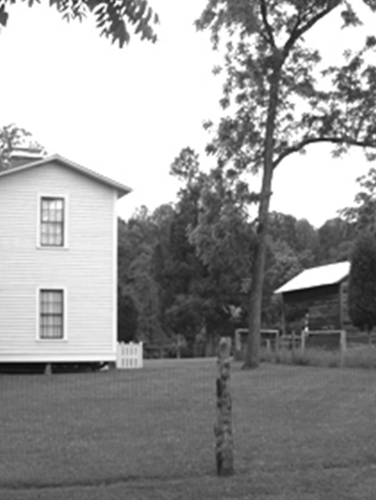
Albert McCoy Farmhouse
(ca. 1886)
The farmhouse is the centerpiece of the McCoy farm, a family operation that has farmed the associated land for more than 140 years.
10401 McCoy Road, Huntersville, NC 28078
The Albert McCoy Farmhouse is a physical reminder of the rural landscape of Mecklenburg County in the late nineteenth and early twentieth centuries. Located on Gar Creek in the Long Creek section of the county, about five miles from the center of present-day Huntersville, the farm was purchased in 1770 by Ezekial Beaty McCoy, who had come to North Carolina from Pennsylvania. The farm has been in the same family since that time. Albert McCoy (1843-1925) acquired 370 acres from the estate of his late father Marshall Rudolphus McCoy (1807-1854), Ezekial Beaty’s grandson, and was farming on the land by 1880. The property has been in continuous agricultural use since at least that time.
Property Quick Links
Educated at Statesville Military Institute, the eighteen-year-old Albert enlisted in Company C of the 37th Regiment (nicknamed “Mecklenburg’s Wide Awakes”) of the Confederate States Army and served as a private until discharged in June 1862 when he returned to his native Mecklenburg County. He married Catherine J. N. Potts in 1866, who died shortly after giving birth to the couple’s only child. Albert later remarried a neighbor, Mary Catherine Gluyas (1850-1919), and the couple had twelve children between 1871 and 1895. Albert was also a founder of St. Mark’s Church, established in 1883 as the first Episcopal church in north Mecklenburg County.
The centerpiece of the historic rural landscape is the McCoy Farmhouse, a two-story timber-frame, side-gable-and-wing dwelling representative of a style that was common throughout Mecklenburg County in the late nineteenth century. Surrounded by a modest collection of outbuildings – including a log crib, wellhouse, smokehouse, and privy – the home and seventy-six acre farm is representative of the many small farmsteads that flourished in the county in the decades after the Civil War. A cemetery for formerly enslaved African Americans is located on the property. It is the final resting place of Lizzie, a formerly enslaved woman in her nineties who lived with the McCoy family in the early 1900s, and her husband Jim. A fund was established in 1949 for the perpetual care of the cemetery.
The well-executed craftsmanship and attention to detail present in both the interior and exterior of the Queen Anne style house are indicative of the work of John Ellis McAuley (1861-1929), a skilled carpenter and builder of local acclaim. The Albert McCoy Farmhouse was McAuley’s first commission for an entire building. In his twenties at the time, McAuley’s success with the McCoy Farmhouse generated numerous other commissions, including the Kerns House (ca. 1880s) on Kerns Road, the W. B. Parks House (ca. 1901) on Beatties Ford Road, and the rectory at St. Mark’s Episcopal Church (ca. 1898) on Mt. Holly-Huntersville Road.
At 370 acres, the McCoy farm was considerably larger than the typical Mecklenburg County farm that averaged 111 acres in 1880. Albert supported his family by cultivating Indian corn, oats, wheat, and cotton while maintaining two one-acre orchards, one of apples and the other peaches. The McCoys also raised poultry, horses, mules, cattle, sheep, pigs, and bees.

